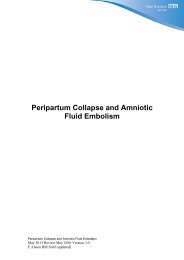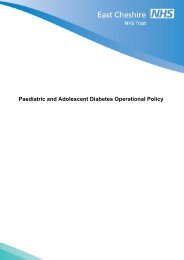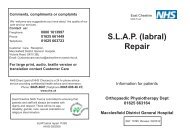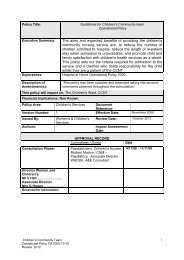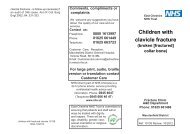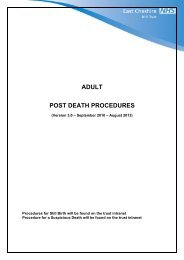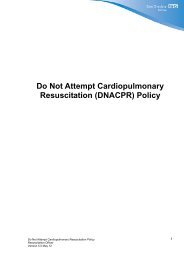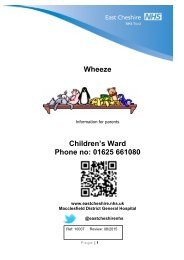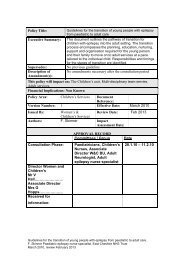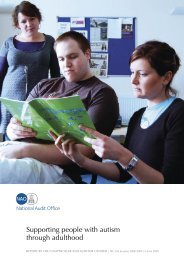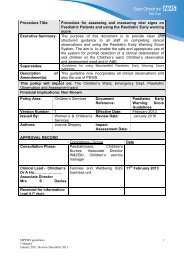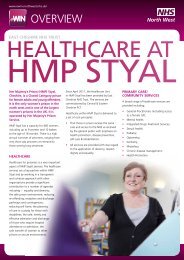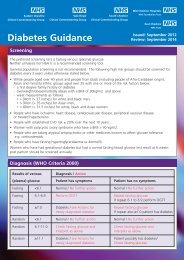Guidelines for oral nutrition support - East Cheshire NHS Trust
Guidelines for oral nutrition support - East Cheshire NHS Trust
Guidelines for oral nutrition support - East Cheshire NHS Trust
Create successful ePaper yourself
Turn your PDF publications into a flip-book with our unique Google optimized e-Paper software.
1.0 INTRODUCTIONAll clinical staff at <strong>East</strong> <strong>Cheshire</strong> <strong>NHS</strong> <strong>Trust</strong> (ECT) have a crucial role to play in achievingand maintaining good <strong>nutrition</strong>al care.Mal<strong>nutrition</strong> (under-<strong>nutrition</strong>) can adversely affect every system in the body. Many patientscoming into hospital are able to drink normally and manage a normal diet during theirhospital stay. Patients identified as “at high” risk of mal<strong>nutrition</strong>, with a MUST (Mal<strong>nutrition</strong>Universal Screening Tool) score of 2 or above, will require <strong>nutrition</strong> <strong>support</strong> to help to meettheir <strong>nutrition</strong>al requirements. Randomised controlled studies and meta-analyses suggestthat <strong>nutrition</strong> <strong>support</strong> of undernourished individuals can reduce mortality, complications afterillness, length of hospital stay, re-admission rates to hospital and costs of care, and alsoimprove well being. 1,2,3Nutrition <strong>support</strong> can be provided by the following: Food <strong>for</strong>tification and use of snacks Use of <strong>oral</strong> <strong>nutrition</strong>al supplements, some of which are prescribable Enteral tube feeding Parenteral <strong>nutrition</strong>Food is the simplest <strong>for</strong>m of <strong>nutrition</strong>al intervention and should always be used first.Oral <strong>nutrition</strong> <strong>support</strong> (food <strong>for</strong>tification, snacks, supplements) is the first-line “treatment” <strong>for</strong>those at risk of mal<strong>nutrition</strong> and should always be considered be<strong>for</strong>e enteral tube feeding orparenteral <strong>nutrition</strong>.2.0 AIMSThe aim is to provide evidence-based guidance <strong>for</strong> the use of food <strong>for</strong>tification and <strong>oral</strong><strong>nutrition</strong>al supplements <strong>for</strong> adult inpatients under the care of health care professionalsworking in ECT.3.0 ORGANISATIONAL RESPONSIBILITIESThe Executive Director of Nursing, who is a member of the <strong>Trust</strong> Board, has overallresponsibility <strong>for</strong> the provision of <strong>nutrition</strong> within ECT. The Clinical Nutrition Steering Group(CNSG) is responsible <strong>for</strong> the oversight of all aspects of <strong>nutrition</strong> within ECT and is currentlyaccountable to the Quality Strategy Steering Group, which is in turn accountable to the <strong>Trust</strong>Board via the Safety and Quality Standards Committee (SQS). For further in<strong>for</strong>mationregarding the role and responsibility of the CNSG in the provision of <strong>nutrition</strong>, refer to the<strong>East</strong> <strong>Cheshire</strong> <strong>NHS</strong> <strong>Trust</strong> Nutrition Policy <strong>for</strong> in-patients (CNSG001).All clinical service team managers are responsible <strong>for</strong> ensuring compliance with thisguidance within their unit/team and that staff are competent and attend appropriate training.Certain professional groups and departments have specific responsibilities.CNSG 003 <strong>East</strong> <strong>Cheshire</strong> <strong>NHS</strong> <strong>Trust</strong> <strong>Guidelines</strong> <strong>for</strong> Oral Nutrition Support in Adults Page 4 of 17



